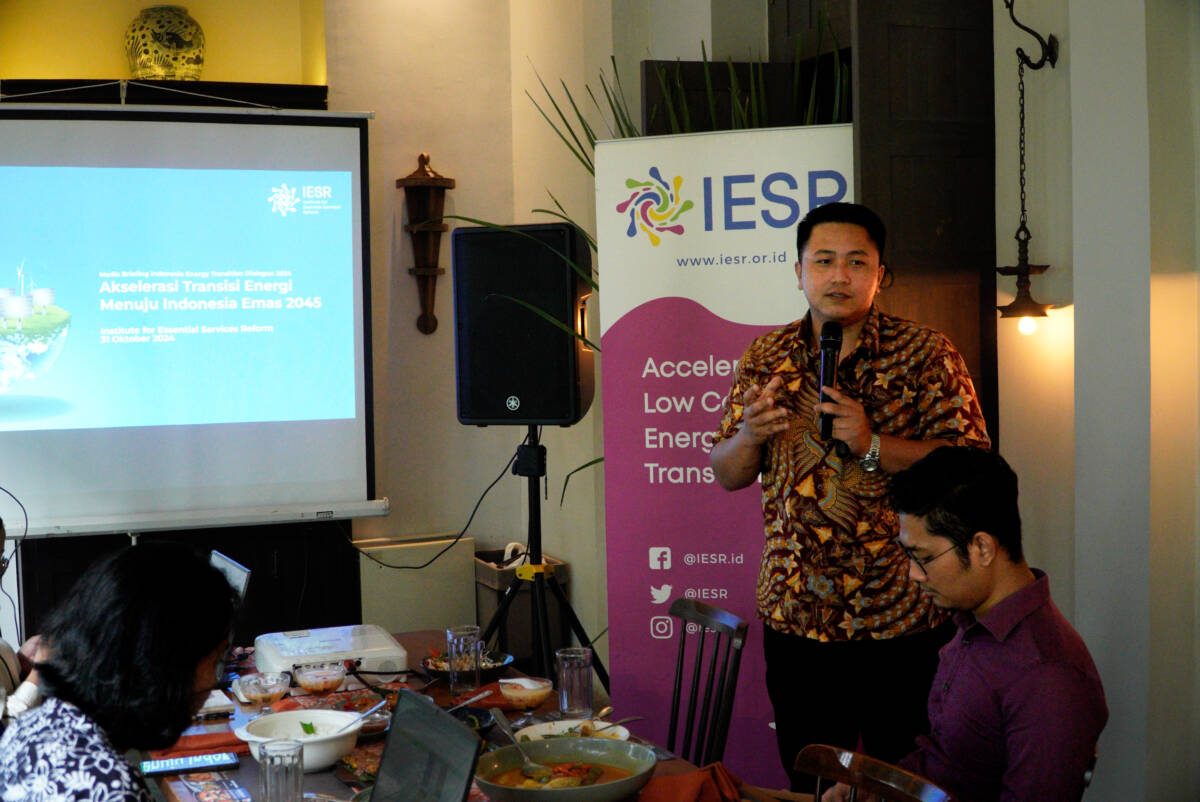Jakarta, October 31, 2024 – Indonesia’s challenging energy transition process demands national commitment and strong leadership to ensure it is fair for the people, supports human development, achieves energy self-sufficiency, and fosters high economic growth, as envisioned by President Prabowo. The next five years will be critical in determining whether Indonesia can successfully overcome the middle-income trap through economic transformation and green growth.
This is one of the key messages the Institute for Essential Services Reform (IESR) and the Indonesia Clean Energy Forum (ICEF) will promote at the Indonesia Energy Transition Dialogue (IETD) 2024, held on November 4-6, 2024, in Jakarta. IETD is an annual event, now in its seventh consecutive year, with this year’s discussion focusing on the theme “Delivering a Just and Orderly Energy Transition.”
IETD 2024 will examine the progress of the energy transition, its implications, opportunities, and connections to economic growth and cross-sectoral planning, including development planning, industrial development, education and human resource quality, and climate change adaptation and mitigation. Through 11 sessions with diverse topics and formats, IETD features 50 national and international speakers, panelists, and moderators, highlighting the energy transition from multiple perspectives and sectors and underscoring the need for clear direction and support from various stakeholders. IESR and ICEF invite all parties to participate in IETD discussions. For detailed event and speaker information, visit ietd.info.
Ahead of IETD 2024 and utilizing the momentum of Indonesia’s new government, IESR urges the Prabowo-Gibran administration to make the energy transition a national mission to accelerate the shift from fossil fuels to renewable energy. This step is expected to strengthen energy security, support sustainable development, and fulfill commitments to reduce greenhouse gas emissions, preventing further global warming.
At last year’s Conference of Parties (COP-28), Indonesia joined 200 other countries in agreeing on the COP decision to triple renewable energy capacity and double energy efficiency efforts by 2030. IESR believes that, under President Prabowo’s leadership, Indonesia needs to incorporate this commitment into national and sectoral energy planning and issue policies to accelerate renewable energy development.
Fabby Tumiwa, Executive Director of IESR, stated that IESR will submit an official letter to relevant ministers, summarizing five key recommendations to expedite the energy transition. According to him, an essential indicator of the government’s commitment to this transition will be an increase in the renewable energy mix in electricity and liquid fuels and a reduction in fossil energy use.
“The acceleration of an equitable energy transition depends on raising Indonesia’s renewable energy mix target and outlining a clear strategy to achieve it in the National Energy Policy (KEN) document, soon to be enacted as a Government Regulation (PP). Additionally, this increased renewable energy target needs to align with other planning documents, such as the National Long-Term Development Plan (RPJPN), the National Medium-Term Development Plan (RPJMN), and the Second Nationally Determined Contribution (SNDC) document, which will be submitted to the UN Climate Agency next year. The government must set a greenhouse gas emission reduction target, particularly for the energy sector, in line with the goal of limiting global temperature rise to 1.5 degrees Celsius,” said Fabby at the IETD 2024 Media Briefing: Policy Memo on Energy Transition in Indonesia (31/10/2024).
Deon Arinaldo, Program Manager of Energy System Transformation at IESR, also highlighted the importance of energy self-sufficiency, a frequent theme from President Prabowo. Deon emphasized that energy self-sufficiency can be achieved through renewable energy, particularly by utilizing solar, wind, and battery technologies.
“Indonesia has abundant renewable energy resources distributed across the country. Developing renewable energy based on each region’s unique potential can increase sustainable energy access, lower energy costs, and strengthen national resilience and energy security, compared to centralized, large-scale energy projects,” Deon added.
IESR encourages strong leadership that prioritizes partnerships and collaboration with both domestic and international stakeholders. IESR believes that cooperation among the government, state-owned enterprises, and the private sector needs to be strengthened according to each entity’s duties and roles.
Arief Rosadi, IESR’s Climate and Energy Diplomacy Program Manager, noted that President Prabowo could demonstrate strategic leadership by building and reinforcing South-South cooperation for a just energy transition. Indonesia’s participation in various international forums, such as the UNFCCC, G20, ASEAN, Belt and Road Initiative (BRI) Forum for International Cooperation, and Indonesia Africa Forum, and its free and active foreign policy provide a solid foundation for Indonesia to lead the energy transition agenda and advance its progress in the Global South.
“President Prabowo can foster South-South cooperation to support and facilitate energy transition and inclusive development in developing countries, aligned with their specific needs and goals,” Arief said.
Intensifying South-South cooperation will not only contribute to Indonesia’s emission reduction efforts in the energy sector but also promote knowledge and technology transfer, bolster the domestic renewable energy industry, and support the achievement of the eight percent economic growth target through increased investment in clean energy infrastructure.
IESR’s Indonesia Energy Transition Policy Memo outlines five main recommendations: first, establish a strong political commitment to the energy transition; second, achieve energy self-sufficiency through renewable energy; third, promote sustainable economic growth by capitalizing on the energy transition momentum; fourth, increase the role and contributions of diverse actors in the energy transition; and fifth, strengthen Indonesia’s leadership in South-South cooperation to advance the energy transition agenda.

